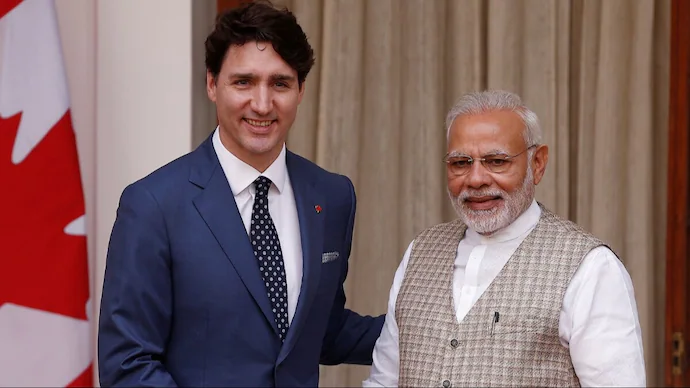19 october 2024 : As speculation grows about Donald Trump’s potential return to the White House, one area that could see a significant shift is the U.S. stance on the Khalistan separatist movement, which has experienced a resurgence in North America. Much of this revival, including violent attacks on Indian consulates and the vandalism of temples in the U.S. and Canada, has occurred during the Biden administration, which has been seen as having a softer approach. If Trump were to regain power, the Khalistan movement may find itself in trouble, as Trump’s “America First” doctrine, his close relationship with Indian Prime Minister Narendra Modi, and his contentious ties with Canadian Prime Minister Justin Trudeau could lead to a tougher crackdown on violent separatism in North America.
Trump’s “America First” Focus on National Security
Central to Trump’s potential approach to the Khalistan issue is his strong “America First” policy, prioritizing national security and sovereignty. Under this framework, any group that threatens public safety or promotes violence would likely face swift action. Trump has consistently positioned himself as a law-and-order leader, unafraid to take a hardline stance on domestic groups that disrupt peace or pose risks to U.S. interests. The violent actions of some Khalistan elements, including attacks on Indian consulates, would likely be viewed as a significant security concern. Furthermore, Trump’s focus on eliminating foreign influences that threaten U.S. law and order could result in a stricter stance on separatist activities stemming from India’s internal conflicts that spill over into North America.
Considering the violent history of the Khalistan movement and recent attacks on Indian diplomatic missions in the U.S., a Trump administration might adopt a more proactive approach to curbing the spread of ethnic violence. As this movement grows in the U.S., with attacks targeting Indian Americans and their institutions, the potential for broader ethnic tensions rises. Trump’s hardline approach to national security could lead to more forceful measures against Khalistan activists, reducing their operational freedom on American soil.
Trump’s Close Ties with Modi: A Key Factor
One reason the Khalistan movement could face difficulties under Trump is his personal rapport with Indian Prime Minister Narendra Modi. The two leaders developed a strong relationship during Trump’s first term, which bolstered U.S.-India cooperation on defense, trade, and counterterrorism. Modi, who enjoys broad support among Indian Americans, has been outspoken against the Khalistan movement, viewing it as a threat to Indian unity and sovereignty. With Modi’s strong opposition to Khalistan separatism, Trump is likely to align with India on this issue.
During Trump’s presidency from 2016 to 2020, the U.S.-India relationship flourished, particularly in defense and strategic areas. Several landmark defense agreements were signed, including the Communications Compatibility and Security Agreement (COMCASA), enabling closer military coordination. This growing partnership also saw the U.S. support India in key international forums, boosting India’s global standing. A return to the White House could see Trump building on this alliance, potentially leading to joint efforts to curb Khalistan extremism in North America.
Should Trump return to office, India could find it easier to work with the U.S. in countering Khalistan violence. Modi’s government has expressed growing concern about the rise of Khalistan activism in the U.S. and Canada. With Trump’s willingness to support Modi, his administration could take a stronger stance against activities that threaten U.S.-India relations.
Trump’s Rocky Relationship with Trudeau: Another Dimension
Complicating this dynamic is Trump’s often contentious relationship with Canadian Prime Minister Justin Trudeau. During his presidency, Trump frequently clashed with Trudeau over trade, immigration, and international diplomacy. This strained relationship could impact Khalistan activists, who have found significant support in Canada, particularly in regions like British Columbia and Ontario, where the movement has a strong base.
Canada’s relatively tolerant approach to Khalistan activism, especially under Trudeau, has been a point of tension between India and Canada. India has repeatedly expressed frustration with Canada’s leniency toward separatist activities targeting its sovereignty. If Trump were to return to power, his personal dislike for Trudeau could lead him to support India’s concerns more strongly. A Trump administration might be more inclined to crack down on cross-border Khalistan activism, pressuring Canada to follow suit or risk straining U.S.-Canada relations. In this scenario, Trudeau’s permissiveness toward Khalistan activism could become a diplomatic liability.
The Geopolitical Stakes for the U.S.
At a time when U.S.-India relations are crucial for countering China’s growing influence in the Indo-Pacific region, ignoring the Khalistan issue could complicate broader geopolitical strategies. India has become a key partner for the U.S., especially in multilateral initiatives like the QUAD, which focuses on regional stability. Any disruptions in U.S.-India relations due to the Khalistan movement could weaken this partnership, undermining U.S. strategic interests in Asia.
Trump’s return to power could solidify the U.S.-India alliance, ensuring that both nations remain aligned in combating not only Khalistan extremism but also broader challenges such as terrorism and security in the Indo-Pacific. Given India’s strong opposition to Khalistan separatism, a Trump administration may be more willing to address New Delhi’s concerns than the current administration, which has been more cautious in its response.
A Difficult Road Ahead for the Khalistan Movement
A Trump presidency could spell trouble for the Khalistan movement in North America. With Trump’s focus on national security, his close relationship with Modi, and his animosity toward Trudeau, the separatist cause may face increased scrutiny and action. The movement, which has shown a propensity for violence, could find itself under greater pressure as the U.S. seeks to maintain law and order and protect its geopolitical interests.
For the Khalistan movement, which has taken advantage of gaps in North America’s political landscape, a Trump administration would likely close those gaps, making it much harder for activists to operate. For India, a Trump presidency could provide the opportunity to finally address the violent extremism that has long been a concern.

